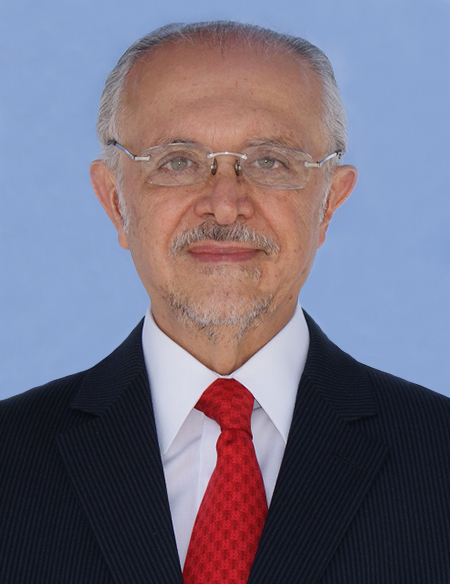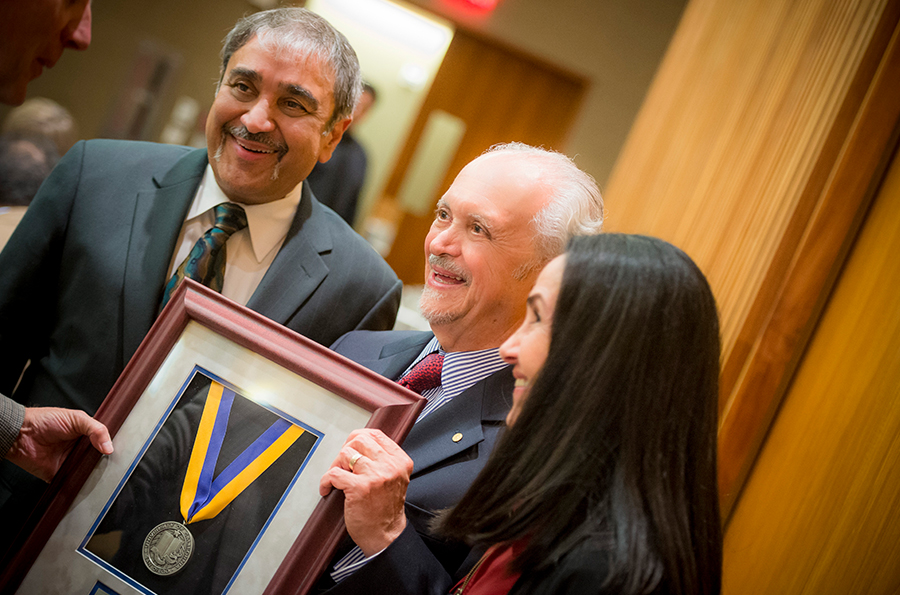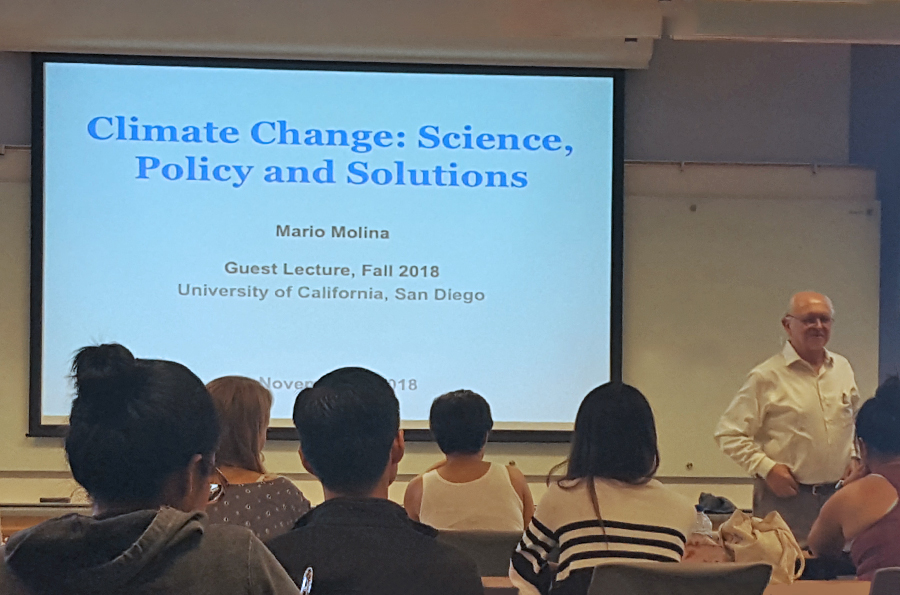Nobel Laureate, Pioneer in Atmospheric Chemistry Mario Molina Dies
Published Date
By:
- Cynthia Dillon
Share This:
Article Content
UC San Diego Distinguished Professor Mario Molina, who won the Nobel Prize in Chemistry in 1995 for his role in elucidating the threat of chlorofluorocarbon gases to the Earth’s ozone layer, died suddenly in his Mexico City home Oct. 7. He was 77 years old.
His unexpected death coincided with the announcement of the winners of this year’s Nobel Prize in Chemistry: Jennifer A. Doudna of the University of California, Berkeley—Molina’s alma mater—and Emmanuelle Charpentier of the Max Planck Unit for the Science of Pathogens, Berlin, Germany.

Nobel Laureate in Chemistry and Distinguished Professor Mario Molina. Photo courtesy of Centro Mario Molina (2020).
“It is especially sad to hear that our Nobel Laureate, Mario Molina, passed away on the very day on which this year’s Nobel Prize in Chemistry was announced. Molina’s prize in chemistry was the first Nobel Prize awarded for work directly on environmental issues. Since then Mario has continued extensive research on aerosols and pollutants but has focused on using his prominence to draw attention to the disparities in the impact of pollutants on the poor and on developing nations,” said Vice Chancellor of Marine Sciences and Director of Scripps Institution of Oceanography Margaret Leinen, who also serves as dean of the School of Marine Sciences at UC San Diego.
Molina will be remembered for dedicating his life to research and working in favor of protecting our environment. He was a pioneer and one of the main scientists in the world dedicated to atmospheric chemistry. He was co-author, with F. Sherwood Rowland, of the 1974 original article predicting the depletion of the ozone layer as a direct consequence of the emissions of certain industrial gases, chlorofluorocarbons (CFCs), earning them the 1995 Nobel Prize in Chemistry along with Paul Crutzen. Molina’s research and publications on the subject led to the United Nations Montreal Protocol, the first international treaty that effectively faced an environmental problem of global scale and anthropogenic origin.
“Mario was a great scientist and an even better person. I feel lucky to have known him as my mentor, colleague and friend,” said Distinguished Professor of Atmospheric Chemistry Kimberly Prather, a leading expert on aerosols who is frequently quoted in the press for insights regarding the airborne transmission of SARS-CoV-2. “He was always such a positive force. He had a deep love for science. I will never forget his huge smile and how he would literally cheer out loud when I would share new discoveries. Losing Mario is a huge loss for us all and our planet.”

Chancellor Pradeep K. Khosla presented Distinguished Professor of Chemistry and Biochemistry Mario Molina with the UC San Diego Medal, the highest honor the university bestows. Photo by Erik Jepsen, UC San Diego Publications (2014).
He joined UC San Diego in 2004 with a joint appointment in the Department of Chemistry and Biochemistry and Scripps Institution of Oceanography, one of the leading research institutions on phenomena associated with climate change. Scripps Institution of Oceanography climate and atmospheric scientist V. Ramanathan had first tried to recruit Molina to the University of Chicago when Ramanathan was a researcher there in the late 1980s. In 2004, Ramanathan finally succeeded by bringing Molina to UC San Diego.
“Chemistry and physics play a central role in climate change. At Scripps, we had the atmospheric physics and dynamics research. What was missing was the chemistry,” said Ramanathan. "I thought bringing him to UC San Diego would tie in all the work going on and pave the way for major discoveries going forward.”
In recent years, Ramanathan and Molina had both become more involved in science policy, with both taking on roles as climate science advisors to governments and religious leaders. They had become more vocal about the importance of avoiding what have been termed “existential” threats to humanity posed by climate change, co-authoring papers analyzing the benefits of reducing emissions of soot, industrial chemicals and other agents that contribute to global warming besides carbon dioxide. Molina also promoted global actions in favor of sustainable development inclusive of vigorous economic growth.
“Mario Molina was an amazing chemist. His Nobel Prize-winning research on CFCs and his strong leadership showed how science can guide international agreements and policy. His teaching and outreach have inspired a new generation of scientists. He was a giant in the field of chemistry, and he will be sorely missed,” said UC San Diego Distinguished Professor and Chair of the Department of Chemistry and Biochemistry Vicki Grassian.
A member of the National Academy of Sciences and the Institute of Medicine in the U.S., Molina was one of the 21 scientists that served on President Barack Obama´s Committee of Advisors on Science and Technology (PCAST) for eight years; he also previously served on President Bill Clinton´s PCAST. Additionally, Molina was a distinguished member of the Vatican´s Pontifical Academy of Sciences, the National College of Mexico, Mexican Academy of Science and the Mexican Academy of Engineering, among others. For his contribution to science he has received numerous awards including over 40 honorary degrees, the Tyler Prize for Environmental Achievement in 1983, the UNEP-Sasakawa Environment Prize in 1995, the Presidential Medal of Freedom and the United Nations Champion of the Earth Award.
Molina was born in Mexico City on March 19, 1943. He earned a chemical engineering degree from the Universidad Nacional Autónoma de México in 1965, a postgraduate degree from the University of Freiburg, Germany in 1967, and a Ph.D. in physical chemistry from the University of California, Berkeley in 1972. As a postdoctoral scholar at the University of California, Irvine and then as an independent scholar, he and his research team published a series of articles between 1976 and 1986 that identified the chemical properties of compounds that play an essential role in the breakdown of the stratospheric ozone layer. Subsequently they demonstrated in a laboratory the existence of a new class of chemical reactions that occur on the surface of ice particles including those that are present in the atmosphere. They also proposed and demonstrated in the lab a new sequence of catalytic reactions that explain a major part of the destruction of ozone in the polar stratosphere.

A roomful of students listen intently to Nobel Laureate and Distinguished Professor Mario Molina during a lecture on climate change. Photo courtesy of the UC San Diego Department of Chemistry and Biochemistry (2018).
Molina was Institute Professor at the Massachusetts Institute of Technology (MIT) between 1989 and 2004; held research and teaching positions at the Universidad Autónoma de México between 1967 and 1968; also at the University of California, Irvine between 1975 and 1979, and at the Jet Propulsion Laboratory of the California Institute of Technology (Caltech) between 1982 and 1989.
In Mexico in 2005, Molina established and presided over a center that carries his name—Centro Mario Molina—and conducted research and promotion of public policies. The Center focuses on strategic studies on energy and environment, particularly in the field of climate change and air quality. He researched the chemistry of atmospheric pollution in the lower atmosphere and was involved in interdisciplinary work, collaborating with experts in order to confront the problem of air quality deterioration in urban areas, contributing with important input to the knowledge and solution of atmospheric pollution in Mexico City´s Metropolitan Area.
Prather, who also serves as director of the Center for Aerosol Impacts on Chemistry of the Environment (CAICE), added about Molina’s death, “It is a huge loss in every regard, as he was an amazing scientist, mentor and kind and gentle person.”
Molina is survived by his wife Guadalupe Álvarez; his sons Felipe Molina and Joshua, Allan and Asher Ginsburg; two grandchildren, Joseph and Luca Ginsburg, and his siblings, Roberto, Luis, Martha and Lucero Molina.
Donations can be made in Mario Molina’s memory by making checks payable to UC San Diego Foundation for the Mario Molina Scholarship and Fellowship in Environmental and Atmospheric Chemistry. Please mail checks to UC San Diego Gift Processing, 9500 Gilman Drive, #0940, La Jolla, CA 92093-0940, noting the gift is in memory of Professor Mario Molina for the following fund: E-6960. Donations can also be made online. (1) Under “Select a Giving Priority,” scroll to Divisions & Schools. (2) Under “Select an Area,” scroll down and click on Physical Sciences. (3) Under “Select a Fund,” scroll down to Mario Molina Scholarship & Fellowship in Environmental and Atmospheric Chemistry. (4) Select or input preferred donation amount.
Arrangements for a celebration of life ceremony are pending.
Share This:
Stay in the Know
Keep up with all the latest from UC San Diego. Subscribe to the newsletter today.



